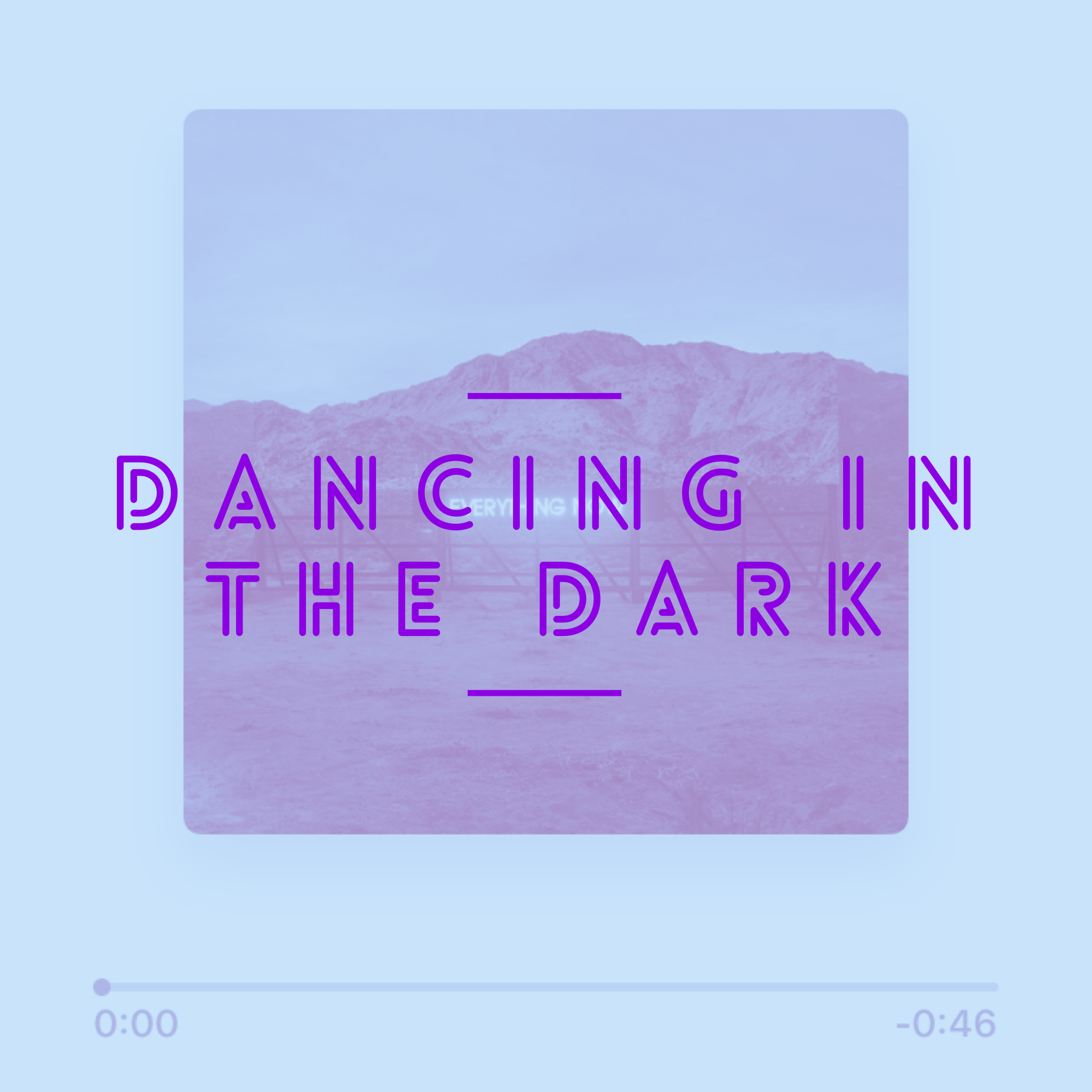Dancing in the Dark
The ABBA-evoking piano swells in the background as Arcade Fire lead singer Win Butler sings out in a staccato groove "Every room in my house is full of s--- I couldn't live without out." The juxstaposition is pronounced. There is triumph and tragedy in Butler's declaration. The music makes you want to dance while the words make you want to mourn the consumerism that has swallowed culture whole.
That's Everything Now in a nutshell. Musically Arcade Fire continues to dance in the direction they started with previous release Reflektor. And the lyrics rummage through the complicated, broken world. There are moments that touch on a darkness the band hasn't hit since Neon Bible. Of course, Arcade Fire is not the first band to sing about the darkness while trying to dance. They won't be the last either, but this band is talented enough that it makes for an interesting, rewarding, if not perfect listen.
The first three tracks--the aforementioned "Everything Now," "Signs of Life," and "Creature Comfort"--are darn good songs that could stand alongside some of the best Arcade Fire has put out. They do the best job marrying an accessible sound with some incisive commentary. I might start cranking "Everything Now" on repeat with the widows down as I drive through the wealthiest zip code in Tennessee.
"Signs of Life" finds a funky groove as it goes out on the town with cool kids to find no life yet shrugs its shoulders and declares they'll just do it again. "Creature Comfort" finishes this opening trio with a jarringly dark and upbeat song about depression, suicide, and self-hatred. Butler wails, "God, make me famous / If you can't, just make it painless" and you can feel the desperation in his voice even as you find yourself bobbing your head.
The album then begins to wobble with two of the weakest tracks: "Peter Pan" and "Chemistry." There are probably several problems here. One is placement on the album. You do your weaker tracks no favors by sitting them immediately after your best. The bigger problem is they just seem to be not-completely-thought-through sketches.
"Peter Pan" tackles the age-old trope of looking at a relationship through the lens of Barrie's fantasy character (and also is not helped coming on the heels Chance the Rapper's much better and surprisingly deeper take on this idea with last year's "Same Drugs"). Then "Chemistry" is a simplistic come-on song which comes off as just lecherous. Now it wouldn't surprise me if that queasy layer in itself was some sort of commentary on male-female relationships, but it never quite tips its hand enough and sort of becomes a throwaway.
The ship rights itself as it heads into the back half. "Infinite Content" and "Infinite_Content" are companion songs that reestablish the album's theme. The first is a punk stomper while the second takes the shape of a slower country twang. Both solely consist of the lyrics "Infinite content, infinite content / we're infinitely content / all your money is already spent on it." In a way I wonder if each short song is a comment about how the hectic big city (first track) and more rural "flyover" states (the second) have been drug into this world where infinite content is the opioid that helps us deal with the world around us.
"Electric Blue" is a shimmering disco-eque ballad that serves to showcase frontwoman's Régine Chassagne otherworldly voice. It's one of those songs you can imagine listening to while driving down a winding moonlit road. Two songs later "Put Your Money on Me" is one of those "I'll never let you down" songs. It's fine. Better than "Peter Pan" and "Chemistry," but not one I anticipate returning to that much.
Maybe this is me reading into things, but it has always seemed like Arcade Fire has been wrestling with God. You could see this in Neon Bible on songs like "Intervention" and "Antichrist Television Blues." On The Suburbs' "City with No Children," Butler sang, "You never trust a millionaire quoting the Sermon on the Mount / I used to think that I was not like him / But I'm beginning to have my doubts / my doubts about it." There are several places where that cage match seems to go on.
"Good God D---" returns to the girl who nearly committed suicide in "Creature Comfort." As she (or Butler) weighs her decision, the haunting refrain floats above the bathtub: "Maybe there's a good God. D---. / Could there be a good God? D---. / Maybe there's a good God. D---." It's a crushingly dark song yet at the end--almost at that last moment--Butler sings "Maybe there's a good God / if He made you." It's a hopeful note, but when you listen to it you almost worry that it's too late.
The closing track "We Don't Deserve Love" is a beautiful heartbreak of a song and frankly one that I'm still parsing out. Not that songs are necessarily puzzles to be solved. But the track, and album proper, end with the singer addressing Mary, this woman who throughout who has been saying "Maybe we don't deserve love." The singer pleads "Mary, roll away the stone / The one that you love is gonna leave you alone / Particularly the Christ-types / Mary, roll away the stone / The ones that you love always leave you alone / It's always the Christ-types you're waiting on."
And I don't know what to do with any of that. It's that wrestling with God that continues and it doesn't seem to truly resolve. It reminds me a little of "Wake Up Dead Man," which closed U2's Pop (an album to which I have seen a few reviewers compare Everything Now). It that song, Jesus is directly referenced. Bono implores him to wake up. In "We Don't Deserve Love," Butler references "Christ-types" and perhaps he's worried those types won't roll away the stone. So he begs Mary to roll it away instead. Is it a loss of faith? Is it making do while we see how faith still plays out? I don't know and I'm not sure that we're supposed to.
In a lot of ways, Everything Now reminds me of Ecclesiastes. From that first lyric I mentioned, where a man has everything he wants and yet it's not enough, to countless moments where it seems like the singer is declaring the meaningless of it all. The cool kids, the creature comforts, our stabs at romantic love, and even our favorite music is not enough to stave off the reality that we are chasing after the wind. The whole album seems to be an act of chasing after the wind. If you listen to it on loop, the last track "Everything Now (continued)" bleeds seamlessly into "Everything_Now (continued)." The first time I listened to the album, I didn't know that it had started over again. We are in this streaming, endless loop where we are chasing after the wind.
We have everything we want. We can stream all of this infinite content and yet it seems to only remind us how finite life is. Even the stitched on coda to "Good God D---" seems to evoke the stitched on coda in Ecclesiastes where the Teacher implores the reader to fear God. If it wasn't all presented in such a musically accessible way, it would be a difficult album to take in. The music is a spoonful of sugar to make some bitter medicine. And the medicine is bitter, but we need to be reminded about the bitterness in this world sometimes. It forces us to dig deeper for the faith, the relationships, and the love that give life more meaning rather than chasing after all of this wind.
This is not Arcade Fire's best album. Many people will always hold up their breakthrough debut Funeral as their crowning achievement. My personal favorite is their Grammy-winning concept album The Suburbs. That's the one that resonates most with me and was the one that really got me into the band. Neon Bible and Reflektor also have their moments. But Everything Now, though not flawless, is a good, challenging, and--in a way that defies odds--enjoyable listen. I'd recommend it. It can be dark and a lot to digest, but I think it's rewarding.








